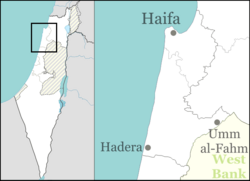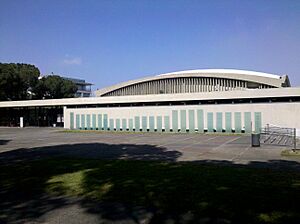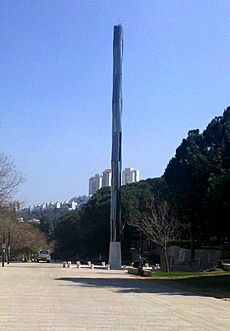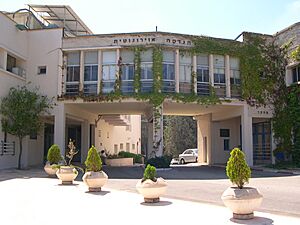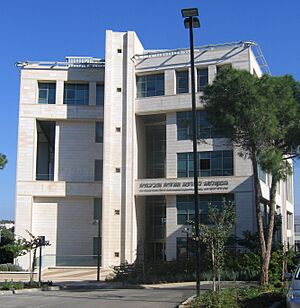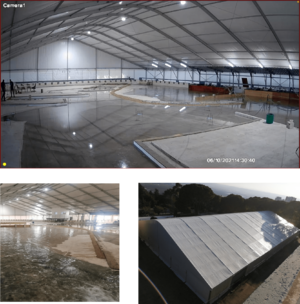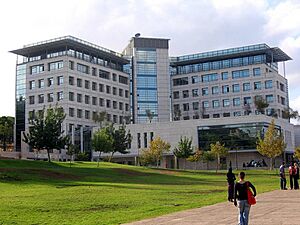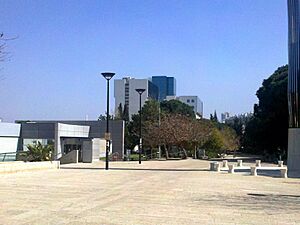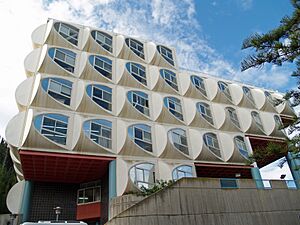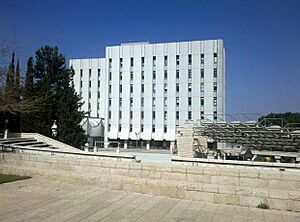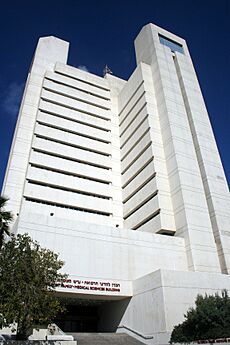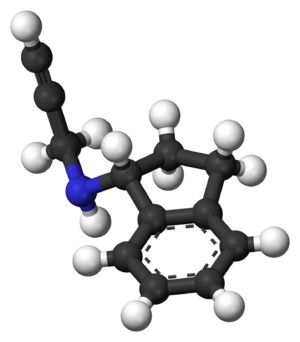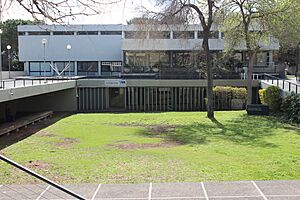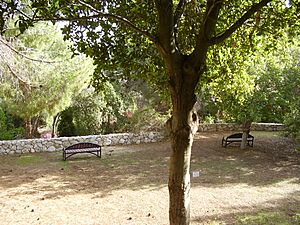Technion – Israel Institute of Technology facts for kids
|
הטכניון – מכון טכנולוגי לישראל (Hebrew)
|
|
 |
|
|
Former name
|
Technikum (1912–1914) |
|---|---|
| Type | Public technical research |
| Established | 11 April 1912 |
| Endowment | US$2.25 billion |
| Budget | US$470 million |
| President | Uri Sivan |
| Students | 13,703 (2014) |
| Undergraduates | 9,251 (2014) |
| Postgraduates | 3,435 (2014) |
| 1,004 (2014) | |
| Location |
,
Israel
32°46′39″N 35°01′18″E / 32.77750°N 35.02167°E |
| Campus | Urban, 1,325 dunams (327 acres) |
| Colors | Navy and Gold |
| Affiliations | CESAER McDonnell International Scholars Academy EuroTech Universities |
The Technion – Israel Institute of Technology is a public university in Haifa, Israel. It was started in 1912, making it the oldest university in Israel.
The Technion offers many degrees in science and engineering. This includes subjects like architecture, medicine, and industrial management. It has 19 different departments and 60 research centers.
Since it began, the Technion has given out over 123,000 degrees. Its graduates have played a big part in creating and protecting the State of Israel.
Many smart people work at Technion. Three of its 565 professors have won Nobel Prizes in chemistry. Four Nobel Prize winners in total have been connected to the university. The current president of Technion is Uri Sivan.
Technion was important in making Hebrew the main language of instruction. This helped Hebrew become Israel's official language. The university also helps Israel's high-tech industry grow, especially in the area known as Silicon Wadi.
Contents
- History of Technion
- Technion Campuses
- Technion Departments
- Aerospace Engineering
- Architecture and Town Planning
- Biology
- Biomedical Engineering
- Biotechnology and Food Engineering
- Civil and Environmental Engineering
- Chemical Engineering
- Chemistry
- Coastal and Marine Engineering Research Institute (CAMERI)
- Computer Science
- Education in Technology and Science
- Electrical Engineering
- Humanities and Arts
- Data and Decision Sciences
- Materials Science and Engineering
- Mathematics
- Mechanical Engineering
- Medicine
- Physics
- Special Research Centers
- Technion International Programs
- Working with Industry and Community
- Rankings and Reputation
- Important Discoveries
- Library System
- Nobel Laureates and Famous People
- See also
History of Technion
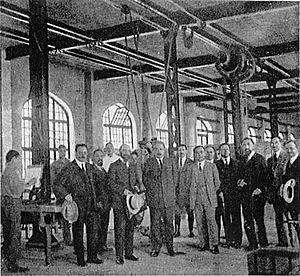
The idea for Technion began in the early 1900s. A German-Jewish group called Ezrah wanted to create a school for engineering and science. It was planned to be the only higher education school in the area at that time.
In 1913, the school's leaders chose German as the teaching language. This caused a big argument known as the War of the Languages. People from America and Russia did not want German to be used. So, in 1914, the leaders changed their minds and chose Hebrew. The German name "Technikum" was also changed to the Hebrew name "Technion."
The first stone for Technion was laid in 1912. Classes officially started 12 years later, in 1924. In 1923, Albert Einstein visited the school. He planted a famous palm tree, which is still there today. This tree stands in front of the old Technion building, which is now a museum. Einstein also started the first Technion Society and was its president when he returned to Germany.
In 1924, Arthur Blok became the first president of Technion. In the 1950s, Technion worked to bring Jewish scientists from other countries to Israel. They helped set up new research labs and teaching departments.
Technion Campuses
Haifa Campus
The main Technion campus is called Technion City. It covers a large area on the slopes of Mount Carmel. There are over 300 buildings on this campus.
Technion also has two other campuses in Haifa. Its first building in midtown Haifa is now the Israel National Museum of Science, Technology, and Space. The medical school, called the Rappaport Faculty of Medicine, is near Rambam Hospital. This is the biggest hospital in Northern Israel.
Students on the main campus can enjoy many activities. There is an Olympic-size swimming pool, and places for gymnastics, squash, and tennis. The Technion Symphony Orchestra and Choir are made up of students and staff. They perform concerts regularly. Movies and live shows by Israeli artists also happen often on campus.
In 2022, a cable car station opened at the main campus. This cable car connects Technion to University of Haifa and to a main bus station.
Tel Aviv Campus
Technion has offered classes in Tel Aviv since 1958. In 2013, it moved to a new campus in Sarona. This campus has three buildings with 16 modern classrooms. Programs taught here include the International MBA program. This program has students from all over the world.
Cornell Tech in New York City
In 2011, Technion teamed up with Cornell University to create a new science and engineering school in New York City. This school is called the Jacobs Technion-Cornell Institute. It was built on Roosevelt Island. The first part of the campus was finished in 2017.
Guangdong Technion Israel Institute of Technology
In 2013, the Li Ka Shing Foundation and Technion decided to create a new technology institute in China. This institute is in Guangdong province and is called the Guangdong Technion-Israel Institute of Technology (GTIIT).
The Li Ka Shing Foundation gave a large amount of money to help build it. Degrees from GTIIT are approved by Technion. English is the main language for teaching. GTIIT offers degrees in engineering, science, and life science. The goal is to have about 5,000 students.
Technion Departments
Technion has many different departments, each focusing on a specific area of science and engineering.
Aerospace Engineering
This department started in 1954. It teaches and researches many topics related to aerospace. It has labs for studying aerodynamics, structures, and rocket engines.
Architecture and Town Planning
This department offers degrees in architecture and landscape architecture. It also has programs for industrial design and urban planning.
Biology
The Biology department began in 1971. Researchers here study many parts of how cells and living things work. They also work with companies that make medicines and biotechnology.
Biomedical Engineering
This department started in 1968. It combines medical and biological engineering. Their research has led to new medical tools. For example, they have found ways to connect the brain to a computer.
Biotechnology and Food Engineering
This department is special in Israel. It combines engineering with life and natural sciences. It has labs for biotechnology and a large plant for processing food.
Civil and Environmental Engineering
In 2002, two older departments, Civil and Agricultural engineering, joined to form this one. It is also home to Technion's International School of Engineering.
Chemical Engineering
This is Israel's oldest and largest chemical engineering department. It trains most of the chemical engineers in Israel. Research here includes materials and how fluids behave.
Chemistry
The Chemistry department offers many joint programs with other fields. These include materials engineering, physics, and food engineering. It also works with the Biology department for a degree in molecular biochemistry.
Coastal and Marine Engineering Research Institute (CAMERI)
This institute studies physical oceanography, marine engineering, and coastal engineering. It has two large research facilities with wave basins and flumes. CAMERI is a national expert on Israel's coast and marine environments.
Computer Science
Started in 1969, this is one of Technion's biggest departments. It has over 1,800 undergraduate students. The department is highly ranked among computer science programs worldwide.
Education in Technology and Science
This department trains students in the best ways to teach science and technology. It also has a research center for this field. Many students here are engineers and scientists who want to become teachers.
Electrical Engineering
The Electrical Engineering department is a major source of engineers in Israel. These engineers work in electronics, computers, and communications. It has strong connections with many industries.
Humanities and Arts
This department offers courses for all Technion students. Topics include philosophy, social sciences, psychology, and various arts.
The Technion Theater started in 1986. It offers courses and puts on many plays. Students and staff are involved in the performances.
Data and Decision Sciences
This department was formerly called Industrial Engineering & Management. It combines engineering with management, economics, and data science. In 2023, its name changed to better show its focus on data and decision-making.
Materials Science and Engineering
This department is Israel's main center for studying materials science. Dan Shechtman, a Nobel Laureate, works here. It has advanced labs for studying materials at a very small scale.
Mathematics
The Mathematics department teaches both pure and applied mathematics. It was home to the famous mathematician Paul Erdős. It also helps students from other Technion departments and runs math competitions for high school students.
Mechanical Engineering
This department started in 1948. It has many students and conducts research in all areas of mechanical engineering. This ranges from tiny nano-scale studies to large national projects.
Medicine
The Ruth and Bruce Rappaport Faculty of Medicine is home to two Nobel Laureates: Avram Hershko and Aaron Ciechanover. It is one of Israel's medical schools. It focuses on basic science research and medical training. Students can earn Master's, PhD, and M.D. degrees. The school also works with other famous universities around the world.
Physics
The Physics department researches topics like astrophysics, high energy physics, and biophysics. It includes several important physics buildings and institutes.
Special Research Centers
Nanotechnology and Science
The Russell Berrie Nanotechnology Institute (RBNI) started in 2005. It is one of the biggest nanotechnology centers in Europe and the US. It has over 110 professors and many graduate students. Its work covers many different fields.
Energy Research
The Grand Technion Energy Program (GTEP) is a center that brings together researchers from different departments. It focuses on finding new energy sources, storing energy, and saving energy. GTEP is the only center in Israel that offers graduate studies in energy science.
Space Research
The Asher Space Research Institute (ASRI) is a special institute for scientific research related to space. It started in 1984. Its members come from different Technion departments, including Physics and Aerospace Engineering.
Technion International Programs
Technion International (TI) offers courses taught completely in English. It started in 2009. Students from all over the world come to study here. They live on campus and enjoy trips and activities in Israel.
Working with Industry and Community
Technion has an office called T3 – Technion Technology Transfer. This office helps turn scientific discoveries into new products and businesses. As of 2011, Technion had been granted 424 patents for its inventions. T3 works with many companies and investors.
Technion also offers special courses for young people after school and in the summer. These courses cover subjects like electronics, computer programming, and biology.
Technion helps students from different backgrounds, including Arab students. The percentage of Arab students at Technion is similar to the percentage of the Arab population in Israel. Technion is also a main sponsor of the FIRST robotics competition in Israel.
Technion works with other universities around the world, like Technische Universität Darmstadt and Washington University in St. Louis.
Rankings and Reputation
| University rankings | |
|---|---|
| Global – Overall | |
| ARWU World | 85 (2024) |
| CWTS World | 303 (2024) |
| QS World | =350 (2026) |
| THE World | 301-350 (2025) |
| USNWR Global | 376 (2025) |
Technion is often called "Israel's MIT" because it is known for its strong math and science programs.
As of June 2023, Technion was ranked 79th in the world by ShanghaiRanking. It was also ranked 317th by USNEWS Global Universities Ranking for 2022-2023. In 2012, Business Insider magazine listed Technion among the top 25 engineering schools globally.
In 2013, Bloomberg Rankings said Technion was one of the top 10 schools outside the U.S. whose graduates become CEOs of major U.S. tech companies.
Important Discoveries
- In 1982, Dan Shechtman discovered a new type of crystal structure called a Quasicrystal. This was thought to be impossible before. He won the Nobel Prize in Chemistry for this in 2011.
- In 2004, two Technion professors, Avram Hershko and Aaron Ciechanover, won the Nobel Prize. They discovered how cells break down proteins.
- Shulamit Levenberg was recognized in 2006 for finding a way to transplant skin that the body would not reject.
- Moussa B.H. Youdim helped develop Rasagiline. This medicine is used to treat diseases like Parkinson's disease.
- In 1998, Technion launched its own small satellite, "Gurwin TechSat II." This made Technion one of only five universities with a student program that builds and launches satellites. The satellite stayed in orbit until 2010.
- In the 1970s, computer scientists Abraham Lempel and Jacob Ziv created the Lempel-Ziv-Welch algorithm. This is a way to compress data, making files smaller.
- In 2019, a team of 12 students won a gold medal at a competition for creating honey without bees.
Library System
The Technion library system includes the Elyachar Central Library and smaller libraries in each department. The Central Library sets the rules and provides services for all Technion libraries. This includes managing books, catalogs, and loans.
The department libraries focus on what their students and staff need. They are changing from traditional libraries to "learning commons." This means they are updating their collections and preserving important historical items.
Nobel Laureates and Famous People
Nobel Laureates from Technion
- 2004 Avram Hershko, Chemistry

- 2004 Aaron Ciechanover, Chemistry

- 2011 Dan Shechtman, Chemistry

- 2013 Arieh Warshel, Chemistry

Notable Faculty Members
- Moshe Arens: Professor of aeronautics.
- Eli Biham: Expert in breaking and creating secret codes.
- Yaakov Dori: Former president of Technion.
- Avram Hershko and Aaron Ciechanover: Won the Nobel Prize in 2004 for their work on how proteins are broken down in cells.
- Abraham Lempel and Jacob Ziv: Developed the LZW data compression algorithm.
- Liviu Librescu: A hero during the Virginia Tech shooting.
- Dan Shechtman: Won the Nobel Prize in 2011 for discovering quasicrystals.
- Rachel Shalon: The first woman engineer in Israel.
Notable Alumni
Many Technion graduates have become leaders in Israel's high-tech industry. It is estimated that over 70% of the founders and managers of high-tech businesses in Israel are Technion graduates.
- Shai Agassi: IT entrepreneur and founder of Better Place.
- Andrei Broder: Helped develop CAPTCHA and worked at Yahoo.
- Andi Gutmans: Developer of PHP and co-founder of Zend Technologies.
- Dov Moran: Inventor of the USB flash drive.
- Daniel M. Lewin: Co-founder of Akamai, sadly passed away during the September 11 attacks.
- Johny Srouji: Senior Vice President of hardware technologies at Apple Inc.
- Arieh Warshel: Won the Nobel Prize in Chemistry in 2013.
- Yehuda and Zohar Zisapel: Known as the "fathers" of Israel's high-tech industry.
See also
 In Spanish: Technion para niños
In Spanish: Technion para niños
- List of universities in Israel
- Science and technology in Israel
- Education in Israel
 | Madam C. J. Walker |
 | Janet Emerson Bashen |
 | Annie Turnbo Malone |
 | Maggie L. Walker |


